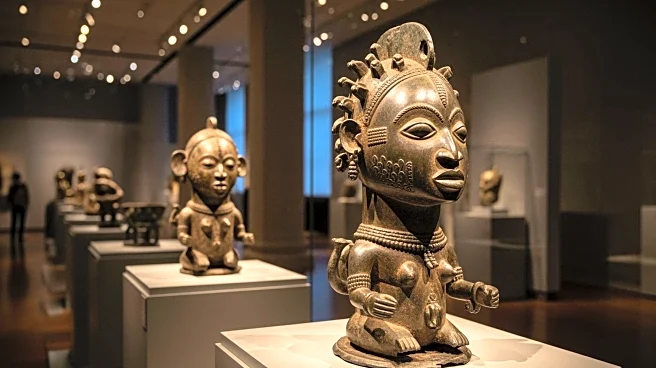What's Happening?
The Dutch government has returned 119 Benin artefacts to Nigeria, marking a significant step in the ongoing efforts to repatriate African cultural heritage. This move is part of a broader initiative to address
the historical injustices of colonialism, where numerous artefacts were taken from African nations and displayed in Western museums. The restitution of these artefacts is seen as a form of reparative justice for African peoples who have been deprived of their cultural heritage for over a century. The return of these artefacts coincides with Restitution Day, an annual event dedicated to assessing progress in the restitution of African cultural items and human remains held in Western institutions.
Why It's Important?
The return of the Benin artefacts is a crucial development in the global conversation about cultural restitution and the legacy of colonialism. It highlights the growing recognition of the need to address historical wrongs and the importance of cultural heritage in national identity and cultural continuity. For Nigeria and other African nations, the return of these artefacts is not only about reclaiming physical objects but also about restoring cultural pride and historical narrative. The move by the Dutch government sets a precedent for other Western nations and institutions that hold African artefacts, potentially leading to more widespread restitution efforts.
What's Next?
The restitution of artefacts is expected to continue as more African nations demand the return of their cultural heritage. Western museums and governments may face increasing pressure to develop comprehensive policies for the restitution of artefacts. This could involve legislative changes to facilitate the return of items without the need for specific laws for each case. Additionally, there may be a push for greater transparency in the inventories of Western museums to identify and return looted artefacts. The success of these efforts will depend on the willingness of Western institutions to engage in meaningful dialogue and cooperation with African nations.
Beyond the Headlines
The restitution of artefacts raises deeper questions about the ethics of museum collections and the role of cultural heritage in post-colonial societies. It challenges Western institutions to reconsider their narratives and the way they present history. The process of restitution also involves addressing the colonial distortions in museum records and the need for accurate representation of cultural items. Furthermore, the return of artefacts can strengthen cultural ties and foster a sense of unity and identity among African communities, both on the continent and in the diaspora.










